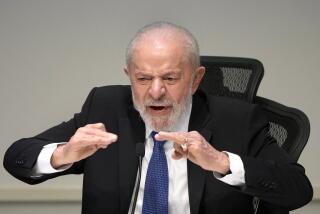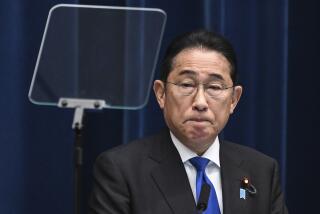In Venezuela, illness could test Hugo Chavez’s legacy
- Share via
CARACAS, Venezuela — President Hugo Chavez’s announcement Saturday night that his cancer has returned and that he may not be able to serve a fourth term is likely to test his political legacy, Venezuela’s Constitution and the opposition’s unity.
Chavez is due to be sworn in Jan. 10, but in a half-hour address to the nation Saturday night, he said that he would leave Sunday for Cuba to undergo his fourth surgery and treatment for pelvic cancer and that he might not be well enough to take the oath of office.
In his address, the visibly despondent Chavez said he should be succeeded by Vice President Nicolas Maduro, 52, a former bus driver who rose to become foreign minister before Chavez named him to his current post.
If “some circumstance” should prevent him from completing his term or starting his next one, Chavez said, Maduro should not only complete the current term but also be elected president to replace him, “in my firm, irrevocable, absolute and total opinion.… This I ask you from the heart.”
But the possibility that Chavez may die or become incapacitated could bring divisions among his followers to the fore, or could boost the chances of an opposition candidate.
According to the Venezuelan Constitution, in the event that a president-elect resigns or dies, the president of the National Assembly, Diosdado Cabello, is required to call new presidential elections within 30 days. Cabello, a former army comrade of Chavez’s, is Maduro’s leading rival for power.
If Chavez takes the oath of office Jan. 10 and then resigns or dies, Maduro as vice president would not automatically succeed him and still would have to submit to a new presidential election called by the congress.
Chavez’s statements were his first acknowledgment since his cancer was diagnosed in June 2011 that his medical condition may prevent him from staying in power. After winning reelection by a wide margin on Oct. 7, Chavez seemed in good health, but then rumors of a relapse began circulating after he left last month for nine days in Cuba.
Francisco Monaldi, a visiting professor teaching political economy at Harvard University’s Kennedy School of Government, said Chavez’s announcement amounted to the beginning of a transition of power.
“The doubts are over. Chavez is deathly ill, and he has named his political successor,” Monaldi said.
Although Chavez made it known that he wants Maduro to succeed him, Maduro’s selection as candidate by the Chavista party, known by its initials PSUV, in Chavez’s absence would be no sure thing, and Cabello could use his considerable power in the legislature and within the military to win leadership, said political scientist Luis Salamanca of the Central University of Venezuela.
“The president has tried to leave established lines of command that won’t necessarily be obeyed,” said Jose Vicente Carrasquero, a professor at Simon Bolivar University in Caracas, Venezuela’s capital.
Moreover, some polls indicate that opposition candidate Henrique Capriles, who was beaten soundly by Chavez in October, would vanquish any other Chavista candidate in a new election, Salamanca said. Capriles is running for governor of Miranda state in Sunday’s state and local elections, and a victory is vital to his chances in any new national election.
Chavez backers who fear Capriles might win a new election could take advantage of the legal vagueness on the timing of a new election to maintain a “constitutional limbo,” Carrasquero speculated.
“In any case, the country is entering a period of much uncertainty,” he said.
Some of the uncertainty stems from the fact there is no clear procedure to nominate the Chavista candidate in a new election. In the upcoming state and local elections, no primaries were held, and Chavez is thought to have selected the candidates for governors.
The opposition’s chance of winning any new election will depend on its ability to maintain the united front that it put up in October’s election, in which all opposition primary candidates fell in line to support Capriles, said Maruja Tarre, an international relations professor at Simon Bolivar University.
“There is a strong possibility of beating any Chavez candidate,” Tarre said. “The opposition’s only chance is to continue with Capriles.”
Mogollon and Kraul are special correspondents. Mogollon reported from Caracas and Kraul from Bogota, Colombia.
More to Read
Sign up for Essential California
The most important California stories and recommendations in your inbox every morning.
You may occasionally receive promotional content from the Los Angeles Times.













